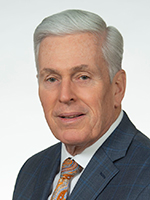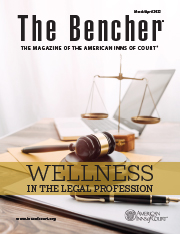Pandemic Technology
The Bencher—March/April 2022
By Chief Judge Michael K. Newell and Ryan P. Newell, Esquire


 For many of us, the legal profession has become a 24/7 career, in large part due to the advent of mobile technology. While that technology has allowed us to churn on despite office closures, the pandemic has only further obliterated work-life boundaries. Used properly, however, technology has advanced in ways that can help us gain some control in the ever-present tug of war between work and our personal lives. Here are some technology tips that may help you work better and experience more of life.
For many of us, the legal profession has become a 24/7 career, in large part due to the advent of mobile technology. While that technology has allowed us to churn on despite office closures, the pandemic has only further obliterated work-life boundaries. Used properly, however, technology has advanced in ways that can help us gain some control in the ever-present tug of war between work and our personal lives. Here are some technology tips that may help you work better and experience more of life.
E-readers: For functionality, it is hard to beat a laptop or tablet. Some laptops can now convert to tablets. For better or worse, work is always accessible through one of these devices. The downside, however, is that their colorful displays render them useless in sunlight and the beautiful resolutions strain your eyes. Further, according to some studies, the blue light can disrupt sleep and decrease serotonin levels after normal working hours, which can send us into a negative spiral if unchecked.
Unlike laptops and tablets, e-readers use “e-ink,” which is easier on the eyes and can be read in direct light. Until recently, e-readers have largely been targeted to those looking for a convenient way to read books. While their portable size is great for pleasure reading, reviewing, for example, a brief or opinion would be difficult. However, a new line of e-readers has emerged targeted at academics and lawyers, who often have to read large PDFs. For example, the ONYX BOOX comes in many sizes, with the largest allowing you to view a full page in one screen. It also allows you to annotate as you read. With USB connectivity, you can quickly download files to the tablet for weekend reading. For those looking to read during a child’s sporting event or to catch some rays at the pool or beach, it is an excellent solution.
Voice apps: Many of us listen to the radio or podcasts as we drive to work, do chores around the house, walk the dog, etc. While a good podcast is always preferable to work, sometimes there is only so much time in the day. Voice apps that will read text from work files can be a great solution. For example, you can listen to transcripts or briefs while you cross off other things that must be accomplished at home or in the office. Some have found good success with the Speechify app, but there are many options.
Dictation devices: Dictation devices are nothing new. While it would probably take some attorneys longer to dictate a letter than to write it, dictation devices are extraordinarily helpful when preparing for oral arguments. By recording prep sessions and then listening to them when time permits, you can reduce the time needed to internalize arguments while also improving the quality of presentation. If you have an iPhone, the free voice recording app on your phone is more than capable.
Integrated phones and wireless headphones: With voice-over-internet phone systems, known as VoIP systems, many firms have the capability to roll calls from your office phone to your cell phone. This can allow you the flexibility to take calls from anywhere. For example, schedule a call for your commute to allow you to get home sooner. Moreover, the advances in wireless headphones over the past year have been significant. An inexpensive but good pair will not only allow you to be hands free as you move about your office or home, but most will even improve the audio quality that you might otherwise get if you were using your speaker phone—an important consideration when speaking with clients or the court.
These are just some solutions to help balance our demanding profession with even more important relationships that exist outside the office—our families and friends, our health, our personal pursuits and hobbies, to name a few. They can help us gain back some control and not miss out on what truly matters. As we know, “Life moves pretty fast. If you don’t stop and look around once in a while, you could miss it,” as Ferris Bueller says.
Michael K. Newell is the chief judge of the Family Court of the State of Delaware. He is a member and past president of the Melson-Arsht American Inn of Court and a member of the Richard K. Herrmann Technology American Inn of Court in Wilmington, Delaware. His son, Ryan P. Newell, Esquire, is a partner at Young Conaway Stargatt & Taylor, LLP in Wilmington, Delaware. He is president of the Richard K. Herrmann Technology American Inn of Court.